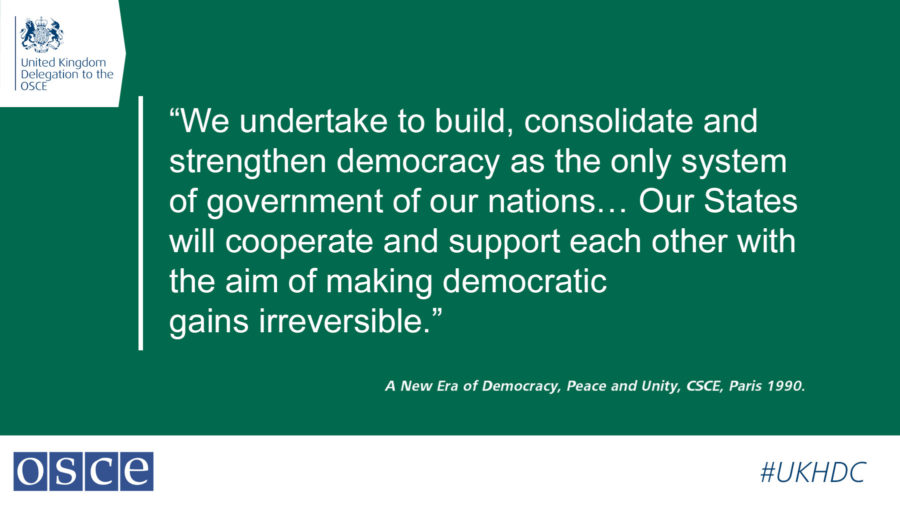22nd February 2017
Relevant, Responsive and Responsible Democracy

Democracy…..has the disadvantage of merely counting votes not weighing them.
(Dean Inge 1860-1954)
Meeting in Paris in 1990 the states of the Conference on Security and Co-operation in Europe, forerunner of the OSCE, heralded ‘A New Era of Democracy, Peace and Unity’:
We undertake to build, consolidate and strengthen democracy as the only system of government of our nations….based on the will of the people, expressed regularly through free and fair elections. ….. respect for the human person and the rule of law…..the best safeguard of freedom of expression, tolerance of all groups of society, and equality of opportunity……
Since that time, although a small number of OSCE states has continued to fight shy of genuine popular choice, the trend has been towards more rather than less democracy and an expanding community of trust based on common values.
Democracy is not a static art form. We now take for granted universal franchise, broadcast parliamentary proceedings, online petitions, social media interaction and the growing diversity of our elected representatives. Whilst the outward form of democratic process evolves however, the fundamental principles of democracy remain the same. So do our 1990 commitments to build and strengthen democracy and to co-operate with the aim of making democratic gains irreversible.
Democracy is increasingly accessible and perhaps, as voters, our expectations have grown too.
We want demonstrable integrity, transparency and honesty. We want politicians to listen and respond to our concerns. We want them to make politics relevant to everyday life. And we rely on them to take sound decisions on our behalf.
Accessibility, 24 hour global news and social media have heightened the challenges, old and new, faced by politicians: how to be heard in a crowded information landscape where fiction and fact mingle; how to engage with a younger generation; how to ensure robust political debate does not fuel societal tension or hurt the vulnerable; how to resolve conflict between personal conviction and the will of the majority; how to be accessible to the public without fear of abuse or violence.
Over the past months democratic processes and institutions across our region have perhaps come under more intense scrutiny than at any time since 1990. The vocabulary of ‘populism’, ‘post-truth’ politics, ‘authoritarian tendencies’, ‘propaganda’ and ‘fake news’ permeates media, academic and political debate.
Governments, and international organisations like the OSCE’s Office of Democratic Institutions and Human Rights, need to understand the challenges in order to safeguard the integrity of democratic institutions and process. The presence in Vienna this week of the OSCE Parliamentary Assembly gives diplomats and experts an excellent opportunity to hear the views of our political counterparts.
As Sir Winston Churchill famously told the House of Commons that “it has been said that democracy is the worst form of Government except all those other forms that have been tried from time to time”.